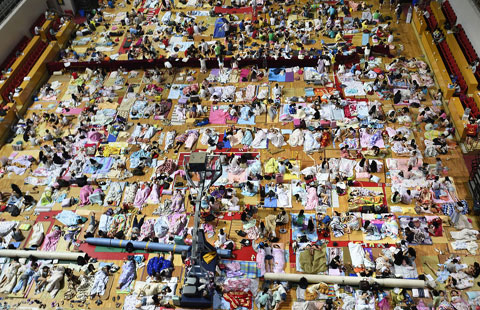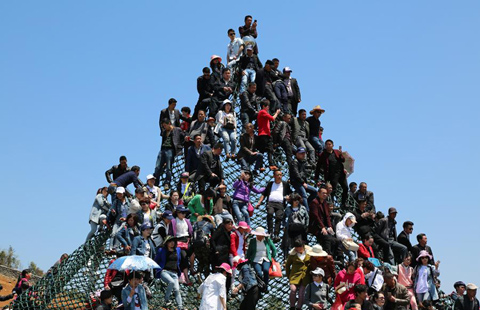China bests MDGS for improved drinking water, sanitation
Updated: 2015-07-01 09:29
(Xinhua)
|
||||||||
UNITED NATIONS - China surpassed the UN Millennium Development Goals (MDGS), a set of eight anti-poverty targets, for improving water and sanitation goals while the world as a whole met only the goal for improved drinking water, two UN agencies reported Tuesday.
The New York-based UN Children's Agency (UNICEF) and the Geneva- based World Health Organization (WHO) Joint Monitoring Project ( JMP) issued its 25-year, 80-page, "Progress on sanitation and drinking water: 2015 update and MDG assessment" at UN Headquarters in New York. It took its 25-year project and measured it against progress of the MDGs.
"Lack of progress on sanitation threatens to undermine the child survival and health benefits from gains in access to safe drinking water around the world," a press release accompanying the report said, adding that 2.4 billion people or one in three people are still without sanitation facilities, "including 946 million people who defecate in the open."
For its part, 40 percent of the total, 1.4 billion people in the 2015 population estimate of China, gained access to the use of improved water facilities since 1990, the report said, while 37 percent gained access during the same period to the use of improved sanitation facilities.
Accompanying charts explained 95 percent of the Chinese population had improved drinking water sources while the MDG target was 88 percent, and 87 percent in China had improved sanitation facilities while the MDG goal was 77 percent, the report said.
"Lack of water, sanitation and hygiene lead to a large burden of disease which is completely preventable," Dr. Nata Menabde, executive director of the WHO office at the UN headquarters, told reporters here. "Children, unfortunately, are disproportionately affected."
"On average nearly 1,000 children under 5 die every day from diarrhea disease linked to unsafe drinking water, poor sanitation or poor hygiene; 151-million children are stunted, leaving them with irreversible physical, and cognitive damage and stunting has been reliably linked to a lack of access to adequate water, sanitation and hygiene," she said. "Stunting is highest in areas in which open defecation rates are observed as high."
"Poor water, sanitation and hygiene are major contributors to 'neglected tropical diseases' (NTDs), like schistosomiasis, trachoma, lymphatic ... and intestinal worms which affect nearly 1. 5 billion of the population every year," the doctor said. "Guinea worm is on track for eradication in the near future and that is due completely to improvement in sanitation and access to drinking water."
Improved drinking water sources referred to "Piped water on premises: Piped household water connection located inside the user 's dwelling, plot or yard" and "Other improved drinking water sources: Public taps or standpipes, tube wells or boreholes, protected dug wells or bore holes protected dug wells, protected springs, rainwater collection," the report said in Annex 1.
But, it was noted, "Bottled water is considered 'improved' for drinking only when the household uses an improved source for cooking and personal hygiene."
"An improved drinking water source is one that, by the nature of its construction, adequately protects the sources from outside contamination, particularly fecal matter," the annex explained.
"Unimproved" included, "unprotected dug well, unprotected spring, cart with small tank/drum, tanker trunk, bottled water" and "surface" drinking sources such as a river, dam, lake, pond, stream, canal or irrigation channel.
"An improved sanitation facility is one that hygienically separates human excreta from human contact," the annex said. " Sanitation facilities shared with other households are not considered to be improved."
"Improved sanitation facilities" include, "flush/pour flush: to piped sewer system, septic tank or pit latrine; ventilation improved latrine, pit latrine with slab, composting toilet," the report annex said. "Open defecation" included, "when human feces are dispose of in fields, forest, bushes, open bodies of water, beaches or other open spaces or disposed with solid waste."
- Health survey finds Chinese people have grown taller, stronger
- State Council demands accelerated housing renovation
- East China's 'most beautiful' high-speed rail opens
- Uygur family saves Han orphan
- Tourists amazed by artificial water cascades in Henan
- Greater independence needed to increase effectiveness of Chinese think tanks
- Mass casualties in Indonesian military plane crash
- Japan's LDP lawmaker denounces Abe's security policies
- More than 100 feared dead in Indonesian military plane crash
- More than 50 may die in Indonesian plane crash
- Japan's Diet gets 1.65m signatures against security bills
- Thailand's first MERS case declared free of deadly virus

 Homes on the wheels
Homes on the wheels
 Ten photos you don't wanna miss - June 30
Ten photos you don't wanna miss - June 30
 Man makes run for the money with business
Man makes run for the money with business
 1,000 students sleep in gym to avoid summer heat
1,000 students sleep in gym to avoid summer heat
 China betting big on these 10 industries
China betting big on these 10 industries
 Political ambition
Political ambition
 7 ways to make graduation travel more memorable
7 ways to make graduation travel more memorable
 Rides that turned deadly at amusement parks
Rides that turned deadly at amusement parks
Most Viewed
Editor's Picks

|

|

|

|

|

|
Today's Top News
Taking a business approach to smog
Bank framework is signed
Li sees Sino-EU economic bond as vital to growth
Obama signs trade bills into law, giving boost to TPP talks
Student arrested for killing girlfriend after China-US operation
Chinese space station for civilian use: Argentina
AIIB shows world’s economic center moving East: Opinion
European visit to find economic synergies
US Weekly

|

|






